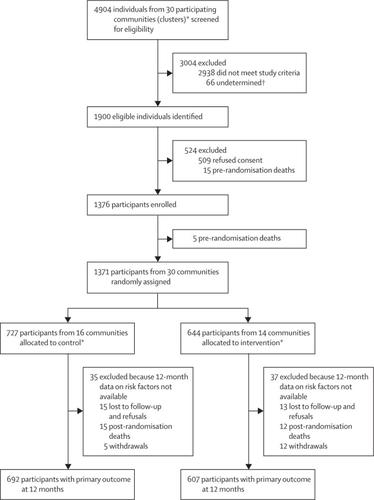Our official English website, www.x-mol.net, welcomes your
feedback! (Note: you will need to create a separate account there.)
A community-based comprehensive intervention to reduce cardiovascular risk in hypertension (HOPE 4): a cluster-randomised controlled trial.
The Lancet ( IF 98.4 ) Pub Date : 2019-09-02 , DOI: 10.1016/s0140-6736(19)31949-x Jon-David Schwalm 1 , Tara McCready 1 , Patricio Lopez-Jaramillo 2 , Khalid Yusoff 3 , Amir Attaran 4 , Pablo Lamelas 1 , Paul A Camacho 5 , Fadhlina Majid 6 , Shrikant I Bangdiwala 7 , Lehana Thabane 8 , Shofiqul Islam 1 , Martin McKee 9 , Salim Yusuf 7
The Lancet ( IF 98.4 ) Pub Date : 2019-09-02 , DOI: 10.1016/s0140-6736(19)31949-x Jon-David Schwalm 1 , Tara McCready 1 , Patricio Lopez-Jaramillo 2 , Khalid Yusoff 3 , Amir Attaran 4 , Pablo Lamelas 1 , Paul A Camacho 5 , Fadhlina Majid 6 , Shrikant I Bangdiwala 7 , Lehana Thabane 8 , Shofiqul Islam 1 , Martin McKee 9 , Salim Yusuf 7
Affiliation

|
BACKGROUND
Hypertension is the leading cause of cardiovascular disease globally. Despite proven benefits, hypertension control is poor. We hypothesised that a comprehensive approach to lowering blood pressure and other risk factors, informed by detailed analysis of local barriers, would be superior to usual care in individuals with poorly controlled or newly diagnosed hypertension. We tested whether a model of care involving non-physician health workers (NPHWs), primary care physicians, family, and the provision of effective medications, could substantially reduce cardiovascular disease risk.
METHODS
HOPE 4 was an open, community-based, cluster-randomised controlled trial involving 1371 individuals with new or poorly controlled hypertension from 30 communities (defined as townships) in Colombia and Malaysia. 16 communities were randomly assigned to control (usual care, n=727), and 14 (n=644) to the intervention. After community screening, the intervention included treatment of cardiovascular disease risk factors by NPHWs using tablet computer-based simplified management algorithms and counselling programmes; free antihypertensive and statin medications recommended by NPHWs but supervised by physicians; and support from a family member or friend (treatment supporter) to improve adherence to medications and healthy behaviours. The primary outcome was the change in Framingham Risk Score 10-year cardiovascular disease risk estimate at 12 months between intervention and control participants. The HOPE 4 trial is registered at ClinicalTrials.gov, NCT01826019.
FINDINGS
All communities completed 12-month follow-up (data on 97% of living participants, n=1299). The reduction in Framingham Risk Score for 10-year cardiovascular disease risk was -6·40% (95% CI 8·00 to -4·80) in the control group and -11·17% (-12·88 to -9·47) in the intervention group, with a difference of change of -4·78% (95% CI -7·11 to -2·44, p<0·0001). There was an absolute 11·45 mm Hg (95% CI -14·94 to -7·97) greater reduction in systolic blood pressure, and a 0·41 mmol/L (95% CI -0·60 to -0·23) reduction in LDL with the intervention group (both p<0·0001). Change in blood pressure control status (<140 mm Hg) was 69% in the intervention group versus 30% in the control group (p<0·0001). There were no safety concerns with the intervention.
INTERPRETATION
A comprehensive model of care led by NPHWs, involving primary care physicians and family that was informed by local context, substantially improved blood pressure control and cardiovascular disease risk. This strategy is effective, pragmatic, and has the potential to substantially reduce cardiovascular disease compared with current strategies that are typically physician based.
FUNDING
Canadian Institutes of Health Research; Grand Challenges Canada; Ontario SPOR Support Unit and the Ontario Ministry of Health and Long-Term Care; Boehringer Ingelheim; Department of Management of Non-Communicable Diseases, WHO; and Population Health Research Institute. VIDEO ABSTRACT.
中文翻译:

以社区为基础的综合干预措施,以降低高血压的心血管风险(HOPE 4):一项整群随机对照试验。
背景技术高血压是全球心血管疾病的主要原因。尽管已证明有益处,但高血压控制仍然很差。我们假设,通过对局部障碍的详细分析,综合降低血压和其他危险因素的方法将优于控制或新诊断的高血压患者的常规护理。我们测试了由非医生卫生工作者(NPHW),初级保健医生,家庭和提供有效药物组成的护理模型是否可以大大降低心血管疾病的风险。方法希望4是一项开放的,以社区为基础,集群随机对照的试验,涉及来自哥伦比亚和马来西亚的30个社区(定义为乡镇)的1371名患有新发或控制不佳的高血压的人。随机分配了16个社区进行控制(常规护理,n = 727),将14个社区(n = 644)进行了干预。在社区筛查之后,干预措施包括由NPHW使用基于平板电脑的简化管理算法和咨询程序治疗心血管疾病危险因素。NPHW推荐免费的降压药和他汀类药物,但在医生的指导下进行;以及家人或朋友(治疗支持者)的支持,以提高对药物和健康行为的依从性。主要结果是干预和对照参与者之间在12个月时Framingham风险评分10年心血管疾病风险估计值的变化。HOPE 4试验已在ClinicalTrials.gov上注册,编号NCT01826019。结果所有社区均完成了12个月的随访(有关97%的在世参与者的数据,n = 1299)。对照组的10年心血管疾病风险Framingham风险评分降低为-6·40%(95%CI 8·00至-4·80)和-11·17%(-12·88至-9) ·47)在干预组中,差异的变化为-4·78%(95%CI -7·11到-2·44,p <0·0001)。收缩压绝对降低了11·45 mm Hg(95%CI -14·94至-7·97),而0·41 mmol / L(95%CI -0·60至-0· 23)干预组降低LDL(p <0·0001)。干预组的血压控制状态变化(<140 mm Hg)为69%,而对照组为30%(p <0·0001)。干预没有安全问题。口译由NPHW领导的综合护理模型,由当地情况决定,涉及初级保健医生和家庭,大大改善了血压控制和心血管疾病的风险。与通常以医师为基础的当前策略相比,该策略是有效的,务实的,并且具有显着减少心血管疾病的潜力。资助加拿大卫生研究所;加拿大大挑战;安大略省SPOR支持单位和安大略省卫生与长期护理部;勃林格殷格翰 世卫组织非传染病管理司;和人口健康研究所。视频摘要。安大略省SPOR支持单位和安大略省卫生与长期护理部;勃林格殷格翰 世卫组织非传染病管理司;和人口健康研究所。视频摘要。安大略省SPOR支持小组和安大略省卫生与长期护理部;勃林格殷格翰 世卫组织非传染病管理司;和人口健康研究所。视频摘要。
更新日期:2019-10-04
中文翻译:

以社区为基础的综合干预措施,以降低高血压的心血管风险(HOPE 4):一项整群随机对照试验。
背景技术高血压是全球心血管疾病的主要原因。尽管已证明有益处,但高血压控制仍然很差。我们假设,通过对局部障碍的详细分析,综合降低血压和其他危险因素的方法将优于控制或新诊断的高血压患者的常规护理。我们测试了由非医生卫生工作者(NPHW),初级保健医生,家庭和提供有效药物组成的护理模型是否可以大大降低心血管疾病的风险。方法希望4是一项开放的,以社区为基础,集群随机对照的试验,涉及来自哥伦比亚和马来西亚的30个社区(定义为乡镇)的1371名患有新发或控制不佳的高血压的人。随机分配了16个社区进行控制(常规护理,n = 727),将14个社区(n = 644)进行了干预。在社区筛查之后,干预措施包括由NPHW使用基于平板电脑的简化管理算法和咨询程序治疗心血管疾病危险因素。NPHW推荐免费的降压药和他汀类药物,但在医生的指导下进行;以及家人或朋友(治疗支持者)的支持,以提高对药物和健康行为的依从性。主要结果是干预和对照参与者之间在12个月时Framingham风险评分10年心血管疾病风险估计值的变化。HOPE 4试验已在ClinicalTrials.gov上注册,编号NCT01826019。结果所有社区均完成了12个月的随访(有关97%的在世参与者的数据,n = 1299)。对照组的10年心血管疾病风险Framingham风险评分降低为-6·40%(95%CI 8·00至-4·80)和-11·17%(-12·88至-9) ·47)在干预组中,差异的变化为-4·78%(95%CI -7·11到-2·44,p <0·0001)。收缩压绝对降低了11·45 mm Hg(95%CI -14·94至-7·97),而0·41 mmol / L(95%CI -0·60至-0· 23)干预组降低LDL(p <0·0001)。干预组的血压控制状态变化(<140 mm Hg)为69%,而对照组为30%(p <0·0001)。干预没有安全问题。口译由NPHW领导的综合护理模型,由当地情况决定,涉及初级保健医生和家庭,大大改善了血压控制和心血管疾病的风险。与通常以医师为基础的当前策略相比,该策略是有效的,务实的,并且具有显着减少心血管疾病的潜力。资助加拿大卫生研究所;加拿大大挑战;安大略省SPOR支持单位和安大略省卫生与长期护理部;勃林格殷格翰 世卫组织非传染病管理司;和人口健康研究所。视频摘要。安大略省SPOR支持单位和安大略省卫生与长期护理部;勃林格殷格翰 世卫组织非传染病管理司;和人口健康研究所。视频摘要。安大略省SPOR支持小组和安大略省卫生与长期护理部;勃林格殷格翰 世卫组织非传染病管理司;和人口健康研究所。视频摘要。











































 京公网安备 11010802027423号
京公网安备 11010802027423号